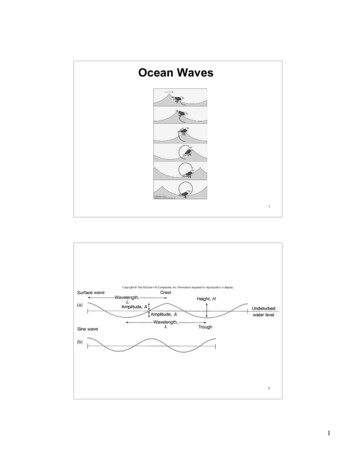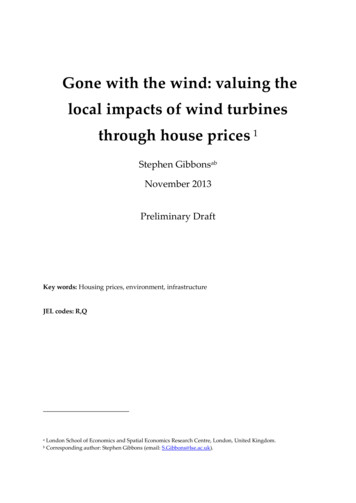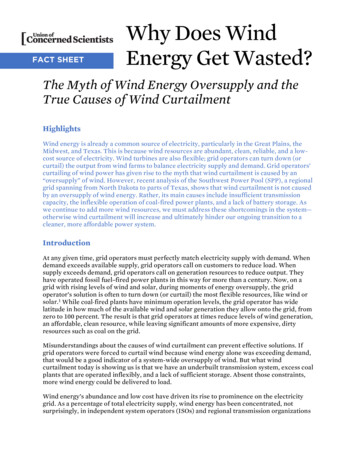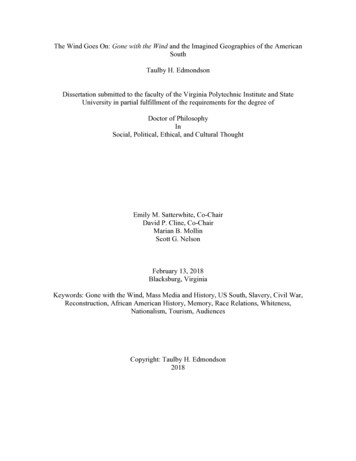
Transcription
GONE WITHTHE WINDMargaret MitchellInfoBooks.org
SYNOPSIS OF GONE WITH THE WINDGone with the Wind is one of the most important classics inAmerican literature. It caused a great impact by presenting thevision of the Southern slave owners during the Civil War.All the facts are presented with great realism, especially whenthe battles are described. It is told through the life of ScarlettO'Hara, the most beautiful and desired young woman inSavannah, Georgia.The story starts with the beginning of the war in April 1861, whenScarlett declares her love to Ashley Wilkes, but he rejects her tomarry Melanie Hamilton. This happens during a party where theflighty Scarlett also meets Rhett Butler, an aristocrat who isbrash in his ways and shrewd in business.Scarlett is torn between two completely different loves andsuffers the greatest losses due to a cruel and destructive war.The greatest impact of this work is to see the evolution of theprotagonist, who heroically crosses a path that she neverthought to walk.If you want to read more about this book you can visit thefollowing linkGone with the Wind Margaret Mitchell at InfoBooks.org
If you wish to read this work in other languages, just clickon the corresponding links: Spanish InfoLibros.org: Lo que el viento se llevó autor MargaretMitchell Portuguese InfoLivros.org: O que o vento levou autor MargaretMitchell French InfoLivres.org: Emporté par le vent auteur Margaret MitchellIf you want to access our digital library with more than3,500 books to read and download for free, we invite youto visit this page: 3,500 free books in PDF format at InfoBooks.org
PART ONECHAPTERISCARLETT O’HARA was not beautiful, but men seldom realizedit when caught by her charm as the Tarleton twins were. In herface were too sharply blended the delicate features of hermother, a Coast aristocrat of French descent, and the heavyones of her florid Irish father. But it was an arresting face,pointed of chin, square of jaw. Her eyes were pale green withouta touch of hazel, starred with bristly black lashes and slightlytilted at the ends. Above them, her thick black brows slantedupward, cutting a startling oblique line in her magnolia-whiteskin—that skin so prized by Southern women and so carefullyguarded with bonnets, veils and mittens against hot Georgiasuns.Seated with Stuart and Brent Tarleton in the cool shade of theporch of Tara, her father’s plantation, that bright Aprilafternoon of 1861, she made a pretty picture. Her new greenflowered-muslin dress spread its twelve yards of billowingmaterial over her hoops and exactly matched the flat-heeledgreen morocco slippers her father had recently brought herfrom Atlanta. The dress set off to perfection the seventeen-inchwaist, the smallest in three counties, and the tightly fittingbasque showed breasts well matured for her sixteen years. But4
for all the modesty of her spreading skirts, the demureness ofhair netted smoothly into a chignon and the quietness of smallwhite hands folded in her lap, her true self was poorlyconcealed. The green eyes in the carefully sweet face wereturbulent, willful, lusty with life, distinctly at variance with herdecorous demeanor. Her manners had been imposed upon herby her mother’s gentle admonitions and the sterner discipline ofher mammy; her eyes were her own.On either side of her, the twins lounged easily in their chairs,squinting at the sunlight through tall mint-garnished glasses asthey laughed and talked, their long legs, booted to the knee andthick with saddle muscles, crossed negligently. Nineteen yearsold, six feet two inches tall, long of bone and hard of muscle,with sunburned faces and deep auburn hair, their eyes merryand arrogant, their bodies clothed in identical blue coats andmustard-colored breeches, they were as much alike as two bollsof cotton.Outside, the late afternoon sun slanted down in the yard,throwing into gleaming brightness the dogwood trees that weresolid masses of white blossoms against the background of newgreen. The twins’ horses were hitched in the driveway, biganimals, red as their masters’ hair; and around the horses’ legsquarreled the pack of lean, nervous possum hounds thataccompanied Stuart and Brent wherever they went. A little5
aloof, as became an aristocrat, lay a black-spotted carriagedog, muzzle on paws, patiently waiting for the boys to go hometo supper.Between the hounds and the horses and the twins there was akinship deeper than that of their constant companionship. Theywere all healthy, thoughtless young animals, sleek, graceful,high-spirited, the boys as mettlesome as the horses they rode,mettlesome and dangerous but, withal, sweet-tempered tothose who knew how to handle them.Although born to the ease of plantation life, waited on hand andfoot since infancy, the faces of the three on the porch wereneither slack nor soft. They had the vigor and alertness ofcountry people who have spent all their lives in the open andtroubled their heads very little with dull things in books. Life inthe north Georgia county of Clayton was still new and,according to the standards of Au- gusta, Savannah andCharleston, a little crude. The more sedate and older sections ofthe South looked down their noses at the up-country Georgians,but here in north Georgia, a lack of the niceties of classicaleducation carried no shame, provided a man was smart in thethings that mattered. And raising good cotton, riding well,shooting straight, dancing lightly, squiring the ladies withelegance and carrying one’s liquor like a gentleman were thethings that mattered.In these accomplishments the twins excelled, and they wereequally outstanding in their notorious inability to learn anything6
contained between the covers of books. Their family had moremoney, more horses, more slaves than any one else in theCounty, but the boys had less grammar than most of their poorCracker neighbors.It was for this precise reason that Stuart and Brent were idlingon the porch of Tara this April afternoon. They had just beenexpelled from the University of Georgia, the fourth universitythat had thrown them out in two years; and their older brothers,Tom and Boyd, had come home with them, because theyrefused to remain at an institution where the twins were notwelcome. Stuart and Brent considered their latest expulsion afine joke, and Scarlett, who had not willingly opened a booksince leaving the Fayetteville Female Academy the year before,thought it just as amusing as they did.“I know you two don’t care about being expelled, or Tomeither,” she said. “But what about Boyd? He’s kind of set ongetting an education, and you two have pulled him out of theUniversity of Virginia and Alabama and South Carolina and nowGeorgia. He’ll never get finished at this rate.”“Oh, he can read law in Judge Parmalee’s office over inFayetteville,” answered Brent carelessly. “Besides, it don’tmatter much. We’d have had to come home before the termwas out anyway.”“Why?”7
“The war, goose! The war’s going to start any day, and youdon’t suppose any of us would stay in college with a war goingon, do you?”“You know there isn’t going to be any war,” said Scarlett, bored.“It’s all just talk. Why, Ashley Wilkes and his father told Pa justlast week that our commissioners in Washington would cometo—to—an—amicable agreement with Mr. Lincoln about theConfederacy. And anyway, the Yankees are too scared of us tofight. There won’t be any war, and I’m tired of hearing about it.”“Not going to be any war!” cried the twins indignantly, asthough they had been defrauded.“Why, honey, of course there’s going to be a war,” said Stuart.The Yankees may be scared of us, but after the way GeneralBeauregard shelled them out of Fort Sumter day beforeyesterday, they’ll have to fight or stand branded as cowardsbefore the whole world. Why, the Confederacy—”Scarlett made a mouth of bored impatience.If you say ‘war’ just once more, I’ll go in the house and shut thedoor. I’ve never gotten so tired of any one word in my life as‘war,’ unless it’s ‘secession.’ Pa talks war morning, noon andnight, and all the gentlemen who come to see him shout aboutFort Sumter and States’ Rights and Abe Lincoln till I get sobored I could scream! And that’s all the boys talk about, too,that and their old Troop. There hasn’t been any fun at any partythis spring because the boys can’t talk about anything else. I’m8
mighty glad Georgia waited till after Christmas before itseceded or it would have ruined the Christmas parties, too. Ifyou say ‘war’ again, I’ll go in the house.”She meant what she said, for she could never long endure anyconversation of which she was not the chief subject. But shesmiled when she spoke, consciously deepening her dimple andfluttering her bristly black lashes as swiftly as butterflies’ wings.The boys were enchanted, as she had intended them to be, andthey hastened to apologize for boring her. They thought nonethe less of her for her lack of interest. Indeed, they thoughtmore. War was men’s business, not ladies’, and they took herattitude as evidence of her femininity.Having maneuvered them away from the boring subject of war,she went back with interest to their immediate situation.“What did your mother say about you two being expelledagain?”The boys looked uncomfortable, recalling their mother’s conductthree months ago when they had come home, by request, fromthe University of Virginia.“Well,” said Stuart, “she hasn’t had a chance to say anythingyet. Tom and us left home early this morning before she got up,and Tom’s laying out over at the Fontaines’ while we came overhere.”“Didn’t she say anything when you got home last night?”9
“We were in luck last night. Just before we got home that newstallion Ma got in Kentucky last month was brought in, and theplace was in a stew. The big brute— he’s a grand horse, Scarlett;you must tell your pa to come over and see him right away—he’d already bitten a hunk out of his groom on the way downhere and he’d trampled two of Ma’s darkies who met the trainat Jonesboro. And just before we got home, he’d about kickedthe stable down and half-killed Strawberry, Ma’s old stallion.When we got home, Ma was out in the stable with a sackful ofsugar smoothing him down and doing it mighty well, too. Thedarkies were hanging from the rafters, popeyed, they were soscared, but Ma was talking to the horse like he was folks and hewas eating out of her hand. There ain’t nobody like Ma with ahorse. And when she saw us she said: ‘In Heaven’s name, whatare you four doing home again? You’re worse than the plaguesof Egypt!’ And then the horse began snorting and rearing andshe said: ‘Get out of here! Can’t you see he’s nervous, the bigdarling? I’ll tend to you four in the morning!’ So we went to bed,and this morning we got away before she could catch us. andleft Boyd to handle her.”“Do you suppose she’ll hit Boyd?” Scarlett, like the rest of theCounty, could never get used to the way small Mrs. Tarletonbullied her grown sons and laid her riding crop on their backs ifthe occasion seemed to warrant it.10
Beatrice Tarleton was a busy woman, having on her hands notonly a large cotton plantation, a hundred negroes and eightchildren, but the largest horse- breeding farm in the state aswell. She was hot-tempered and easily plagued by the frequentscrapes of her four sons, and while no one was permitted towhip a horse or a slave, she felt that a lick now and then didn’tdo the boys any harm.“Of course she won’t hit Boyd. She never did beat Boyd muchbecause he’s the oldest and besides he’s the runt of the litter,”said Stuart, proud of his six feet two. “That’s why we left him athome to explain things to her. God’lmighty, Ma ought to stoplicking us! We’re nineteen and Tom’s twenty-one, and she actslike we’re six years old.”“Will your mother ride the new horse to the Wilkes barbecuetomorrow?”“She wants to, but Pa says he’s too dangerous. And, anyway,the girls won’t let her. They said they were going to have her goto one party at least like a lady, riding in the carriage.”“I hope it doesn’t rain tomorrow,” said Scarlett. “It’s rainednearly every day for a week. There’s nothing worse than abarbecue turned into an indoor picnic.”“Oh, it’ll be clear tomorrow and hot as June,” said Stuart. “Lookat Oat sunset I never saw one redder. You can always tellweather by sunsets.”11
They looked out across the endless acres of Gerald O’Hara’snewly plowed cotton fields toward the red horizon. Now that thesun was setting in a welter of crimson behind tin lulls across theFlint River, the warmth of the April day was ebbing into a faintbut balmy chill.Spring had come early that year, with warm quick rains andsudden frothing of pink peach blossoms and dogwood dapplingwith white stars the dark river swamp and far-off hills. Alreadythe plowing was nearly finished, and the bloody glory of thesunset colored the fresh-cut furrows of red Georgia clay to evenredder hues. The moist hungry earth, waiting upturned for thecotton seeds, showed pinkish on the sandy tops of furrows,vermilion and scarlet and maroon where shadows lay along thesides of the trenches. The whitewashed brick plantation houseseemed an island set in a wild red sea, a sea of spiraling,curving, crescent billows petrified suddenly at the moment whenthe pink-tipped waves were breaking into surf. For here were nolong, straight furrows, such as could be seen in the yellow clayfields of the flat middle Georgia country or in the lush blackearth of the coastal plantations. The rolling foothill country ofnorth Georgia was plowed in a million curves to keep the richearth from washing down into the river bottoms.It was a savagely red land, blood-colored after rains, brick dustin droughts, the best cotton land in the world. It was a pleasantland of white houses, peaceful plowed fields and sluggish yellow12
rivers, but a land of contrasts, of brightest sun glare anddensest shade. The plantation clearings and miles of cottonfields smiled up to a warm sun, placid, complacent. At theiredges rose the virgin forests, dark and cool even in the hottestnoons, mysterious, a little sinister, the soughing pines seemingto wait with an age-old patience, to threaten with soft sighs: “Becareful! Be careful! We had you once. We can take you backagain.”To the ears of the three on the porch came the sounds ofhooves, the jingling of harness chains and the shrill carelesslaughter of negro voices, as the field hands and mules came infrom the fields. From within the house floated the soft voice ofScarlett’s mother, Ellen O’Hara, as she called to the little blackgirl who carried her basket of keys. The high-pitched, childishvoice answered “Yas’m,” and there were sounds of footstepsgoing out the back way toward the smokehouse where Ellenwould ration out the food to the home-coming hands. There wasthe click of china and the rattle of silver as Pork, the valet-butlerof Tara, laid the table for supper.At these last sounds, the twins realized it was time they werestarting home. But they were loath to face their mother andthey lingered on the porch of Tara, momentarily expectingScarlett to give them an invitation to supper.“Look, Scarlett. About tomorrow,” said Brent. “Just becausewe’ve been away and didn’t know about the barbecue and the13
ball, that’s no reason why we shouldn’t get plenty of dancestomorrow night. You haven’t promised them all, have you?”“Well, I have! How did I know you all would be home? I couldn’trisk being a wallflower just waiting on you two.”“You a wallflower!” The boys laughed uproariously.“Look, honey. You’ve got to give me the first waltz and Stu thelast one and you’ve got to eat supper with us. We’ll sit on thestair landing like we did at the last ball and get Mammy Jincy tocome tell our fortunes again.”“I don’t like Mammy Jincy’s fortunes. You know she said I wasgoing to marry a gentleman with jet-black hair and a long blackmustache, and I don’t like black- haired gentlemen.”“You like ‘em red-headed, don’t you, honey?” grinned Brent“Now, come on, promise us all the waltzes and the supper.”“If you’ll promise, we’ll tell you a secret,” said Stuart. “What?”cried Scarlett, alert as a child at the word.“Is it what we heard yesterday in Atlanta, Stu? If it is, you knowwe promised not to tell.”“Well, Miss Pitty told us.” “Miss Who?”“You know, Ashley Wilkes’ cousin who lives in Atlanta, MissPittypat Hamilton—Charles and Melanie Hamilton’s aunt.”“I do, and a sillier old lady I never met in all my life.”14
“Well, when we were in Atlanta yesterday, waiting for the hometrain, her carriage went by the depot and she stopped andtalked to us, and she told us there was going to be anengagement announced tomorrow night at the Wilkes ball.”“Oh, I know about that,” said Scarlett in disappointment. “Thatsilly nephew of hers, Charlie Hamilton, and Honey Wilkes.Everybody’s known for years that they’d get married some time,even if he did seem kind of lukewarm about it.”“Do you think he’s silly?” questioned Brent. “Last Christmas yousure let him buzz round you plenty.”“I couldn’t help him buzzing,” Scarlett shrugged negligently. “Ithink he’s an awful sissy.”“Besides, it isn’t his engagement that’s going to be announced,”said Stuart triumphantly. “It’s Ashley’s to Charlie’s sister, MissMelanie!”Scarlett’s face did not change but her lips went white—like aperson who has received a stunning blow without warning andwho, in the first moments of shock, does not realize what hashappened. So still was her face as she stared at Stuart that he,never analytic, took it for granted that she was merely surprisedand very interested.“Miss Pitty told us they hadn’t intended announcing it till nextyear, because Miss Melly hasn’t been very well; but with all thewar talk going around, everybody in both families thought itwould be better to get married soon. So it’s to be announced15
tomorrow night at the supper intermission. Now, Scarlett, we’vetold you the secret, so you’ve got to promise to eat supper withus.”“Of course I will,” Scarlett said automatically.“And all the waltzes?” “All.”“You’re sweet! I’ll bet the other boys will be hopping mad.”“Let ‘em be mad,” said Brent. “We two can handle ‘em. Look,Scarlett. Sit with us at the barbecue in the morning.”“What?”Stuart repeated his request. “Of course.”The twins looked at each other jubilantly but with some surprise.Although they considered themselves Scarlett’s favored suitors,they had never before gained tokens of this favor so easily.Usually she made them beg and plead, while she put them off,refusing to give a Yes or No answer, laughing if they sulked,growing cool if they became angry. And here she hadpractically promised them the whole of tomorrow—seats by herat the barbecue, all the waltzes (and they’d see to it that thedances were all waltzes!) and the supper intermission. This wasworth getting expelled from the university.Filled with new enthusiasm by their success, they lingered on,talking about the barbecue and the ball and Ashley Wilkes andMelanie Hamilton, interrupting each other, making jokes and16
laughing at them, hinting broadly for invitations to supper.Some time had passed before they realized that Scarlett washaving very little to say. The atmosphere had somehowchanged. Just how, the twins did not know, but the fine glowhad gone out of the afternoon. Scarlett seemed to be payinglittle attention to what they said, although she made the correctanswers. Sensing something they could not understand, baffledand annoyed by it, the twins struggled along for a while, andthen rose reluctantly, looking at their watches.The sun was low across the new-plowed fields and the tallwoods across the river were looming blackly in silhouette.Chimney swallows were darting swiftly across the yard, andchickens, ducks and turkeys were waddling and strutting andstraggling in from the fields.Stuart bellowed: “Jeems!” And after an interval a tall black boyof their own age ran breathlessly around the house and outtoward the tethered horses. Jeems was their body servant and,like the dogs, accompanied them everywhere. He had been theirchildhood playmate and had been given to the twins for theirown on their tenth birthday. At the sight of him, the Tarletonhounds rose up out of the red dust and stood waitingexpectantly for their masters. The boys bowed, shook handsand told Scarlett they’d be over at the Wilkeses’ early in themorning, waiting for her. Then they were off down the walk at arush, mounted their horses and, followed by Jeems, went down17
the avenue of cedars at a gallop, waving their hats and yellingback to her.When they had rounded the curve of the dusty road that hidthem from Tara,Brent drew his horse to a stop under a clump of dogwood.Stuart halted, too, and the darky boy pulled up a few pacesbehind them. The horses, feeling slack reins, stretched downtheir necks to crop the tender spring grass, and the patienthounds lay down again in the soft red dust and looked uplongingly at the chimney swallows circling in the gathering dusk.Brent’s wide ingenuous face was puzzled and mildly indignant.“Look,” he said. “Don’t it look to you like she would of asked usto stay for supper?”“I thought she would,” said Stuart. I kept waiting for her to doit, but she didn’t.What do you make of it?”“I don’t make anything of it But it just looks to me like shemight of. After all, it’s our first day home and she hasn’t seen usin quite a spell. And we had lots more things to tell her.”“It looked to me like she was mighty glad to see us when wecame.” “I thought so, too.”“And then, about a half-hour ago, she got kind of quiet, like shehad a headache.”18
“I noticed that but I didn’t pay it any mind then. What do yousuppose ailed her?”“I dunno. Do you suppose we said something that made hermad?” They both thought for a minute.“I can’t think of anything. Besides, when Scarlett gets mad,everybody knows it.She don’t hold herself in like some girls do.”“Yes, that’s what I like about her. She don’t go around beingcold and hateful when she’s mad—she tells you about it. But itwas something we did or said that made her shut up talkingand look sort of sick. I could swear she was glad to see us whenwe came and was aiming to ask us to supper.”“You don’t suppose it’s because we got expelled?”“Hell, no! Don’t be a fool. She laughed like everything when wetold her about it. And besides Scarlett don’t set any more storeby book learning than we do.”Brent turned in the saddle and called to the negro groom.“Jeems!”“Suh?”“You heard what we were talking to Miss Scarlett about?”“Nawsuh, Mist’ Brent! Huccome you think Ah be spyin’ on w’itefolks?” “Spying, my God! You darkies know everything that goeson. Why, you liar, I19
saw you with my own eyes sidle round the corner of the porchand squat in the cape jessamine bush by the wall. Now, did youhear us say anything that might have made Miss Scarlett mad—or hurt her feelings?”Thus appealed to, Teems gave up further pretense of not havingoverheard theconversation and furrowed his black brow.“Nawsuh, Ah din’ notice y’all say anything ter mek her mad.Look ter me lak she sho glad ter see you an’ sho had missedyou, an’ she cheep along happy as a bird, tell ‘bout de time y’allgot ter talkin’ ‘bout Mist’ Ashley an’ Miss Melly Hamilton gittin’mah’ied. Den she quiet down lak a bird w’en de hawk fly ober.”The twins looked at each other and nodded, but withoutcomprehension.“Jeems is right. But I don’t see why,” said Stuart. “My Lord!Ashley don’t mean anything to her, ‘cept a friend. She’s notcrazy about him. It’s us she’s crazy about.”Brent nodded an agreement.“But do you suppose,” he said, “that maybe Ashley hadn’t toldher he was going to announce it tomorrow night and she wasmad at him for not telling her, an old friend, before he toldeverybody else? Girls set a big store on knowing such thingsfirst.”20
“Well, maybe. But what if he hadn’t told her it was tomorrow? Itwas supposed to be a secret and a surprise, and a man’s got aright to keep his own engagement quiet, hasn’t he? We wouldn’thave known it if Miss Melly’s aunt hadn’t let it out. But Scarlettmust have known he was going to marry Miss Melly sometime.Why, we’ve known it for years. The Wilkes and Hamiltons alwaysmarry their own cousins. Everybody knew he’d probably marryher some day, just like Honey Wilkes is going to marry MissMelly’s brother, Charles.”“Well, I give it up. But I’m sorry she didn’t ask us to supper. Iswear I don’t want to go home and listen to Ma take on aboutus being expelled. It isn’t as if this was the first time.”“Maybe Boyd will have smoothed her down by now. You knowwhat a slick talker that little varmint is. You know he always cansmooth her down.”“Yes, he can do it, but it takes Boyd time. He has to talk aroundin circles till Ma gets so confused that she gives up and tells himto save his voice for his law practice. But he ain’t had time toget good started yet. Why, I’ll bet you Ma is still so excitedabout the new horse that she’ll never even realize we’re homeagain till She sits down to supper tonight and sees Boyd. Andbefore supper is over she’ll be going strong and breathing fire.And it’ll be ten o’clock before Boyd gets a chance to tell her thatit wouldn’t have been honorable for any of us to stay in collegeafter the way the Chancellor talked to you and me. And it’ll bemidnight before he gets her turned around to where she’s so21
mad at the Chancellor she’ll be asking Boyd why he didn’t shoothim. No, we can’t go home till after midnight”The twins looked at each other glumly. They were completelyfearless of wild horses, shooting affrays and the indignation oftheir neighbors, but they had a wholesome fear of their redhaired mother’s outspoken remarks and the riding crop that shedid not scruple to lay across their breeches.“Well, look,” said Brent. “Let’s go over to the Wilkes’. Ashley andthe girls’ll be glad to have us for supper.”Stuart looked a little discomforted.“No, don’t let’s go there. They’ll be in a stew getting ready forthe barbecue tomorrow and besides—”“Oh, I forgot about that,” said Brent hastily. “No, don’t let’s gothere.”They clucked to their horses and rode along in silence for awhile, a flush of embarrassment on Stuart’s brown cheeks. Untilthe previous summer, Stuart had courted India Wilkes with theapprobation of both families and the entire County. The Countyfelt that perhaps the cool and contained India Wilkes wouldhave a quieting effect on him. They fervently hoped so, at anyrate. And Stuart might have made the match, but Brent had notbeen satisfied. Brent liked India but he thought her mighty plainand tame, and he simply could not fall in love with her himself to22
keep Stuart company. That was the first time the twins’ interesthad ever diverged, and Brent was resentful of his brother’sattentions to a girl who seemed to him not at all remarkable.Then, last summer at a political speaking in a grove of oak treesat Jonesboro, they both suddenly became aware of ScarlettO’Hara. They had known her for years, and, since theirchildhood, she had been a favorite playmate, for she could ridehorses and climb trees almost as well as they. But now to theiramazement she had become a grown-up young lady and quitethe most charming one in all the world.They noticed for the first time how her green eyes danced, howdeep her dimples were when she laughed, how tiny her handsand feet and what a small waist she had. Their clever remarkssent her into merry peals of laughter and, inspired by thethought that she considered them a remarkable pair, they fairlyoutdid themselves.It was a memorable day in the life of the twins. Thereafter,when they talked it over, they always wondered just why theyhad failed to notice Scarlett’s charms before. They never arrivedat the correct answer, which was that Scarlett on that day haddecided to make them notice. She was constitutionally unableto endure any man being in love with any woman not herself,and the sight of India Wilkes and Stuart at the speaking hadbeen too much for her predatory nature. Not content withStuart alone, she had set her cap for Brent as well, and with athoroughness that overwhelmed the two of them.23
Now they were both in love with her, and India Wilkes and LettyMunroe, from Lovejoy, whom Brent had been half-heartedlycourting, were far in the back of their minds. Just what the loserwould do, should Scarlett accept either one of them, the twinsdid not ask. They would cross that bridge when they came to it.For the present they were quite satisfied to be in accord againabout one girl, for theyhad no jealousies between them. It was a situation whichinterested the neighbors and annoyed their mother, who had noliking for Scarlett.“It will serve you right if that sly piece does accept one of you,”she said. “Or maybe she’ll accept both of you, and then you’llhave to move to Utah, if the Mormons’ll have you—which Idoubt. . All that bothers me is that some one of these daysyou’re both going to get lickered up and jealous of each otherabout that two-faced, little, green-eyed baggage, and you’llshoot each other. But that might not be a bad idea either.”Since the day of the speaking, Stuart had been uncomfortablein India’s presence. Not that India ever reproached him or evenindicated by look or gesture that she was aware of his abruptlychanged allegiance. She was too much of a lady. But Stuart feltguilty and ill at ease with her. He knew he had made India lovehim and he knew that she still loved him and, deep in his heart,he had the feeling that he had not played the gentleman. He still24
liked her tremendously and respected her for her cool goodbreeding, her book learning and all the sterling qualities shepossessed. But, damn it, she was just so pallid and uninterestingand always the same, beside Scarlett’s bright and changeablecharm. You always knew where you stood with India and younever had the slightest notion with Scarlett. That was enough todr
SYNOPSIS OF GONE WITH THE WIND Gone with the Wind is one of the most important classics in . If you want to read more about this book you can visit the following link Gone with the Wind Margaret Mitchell at InfoBooks.org . . 3,500 books to read and download for free, we invite you to visit this page: 3,500 free books in PDF format at .










